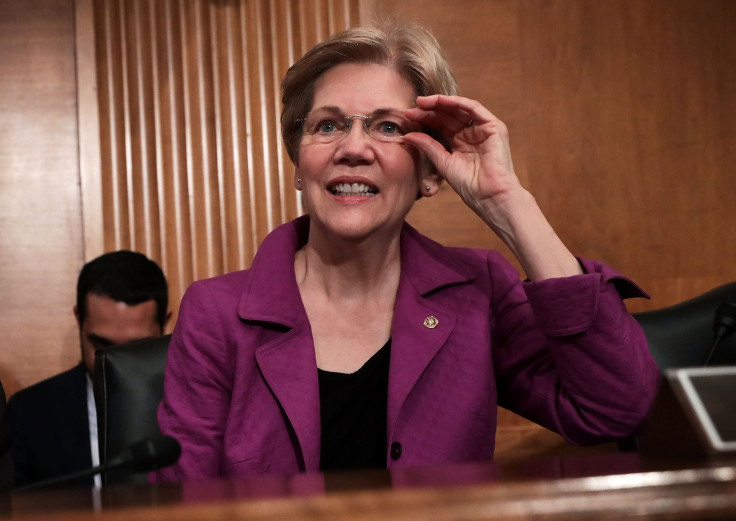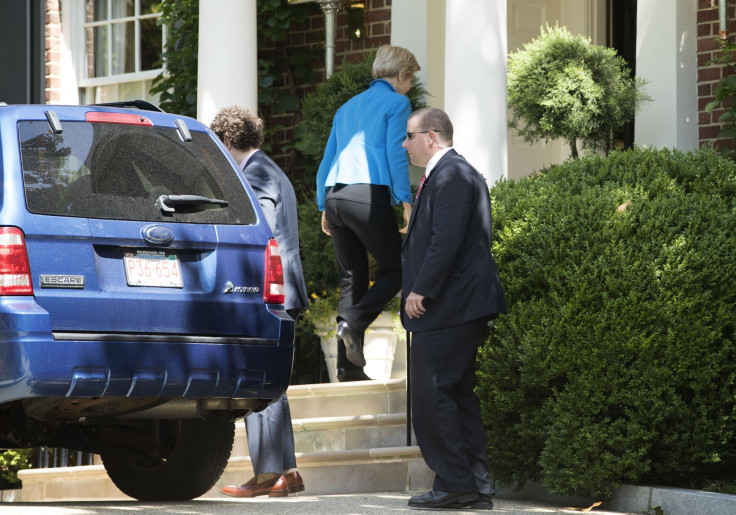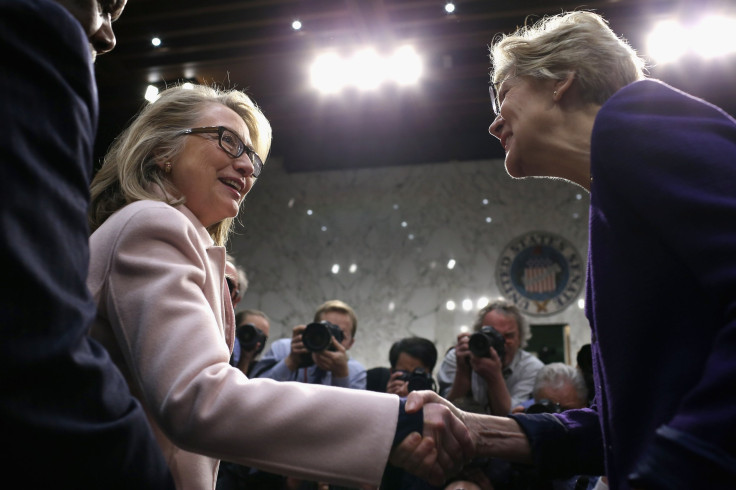Hillary Clinton Wall Street Ties, Speeches Still Matter After Elizabeth Warren Endorsement, Here’s Why

Six months ago, the notion that banking reform champion Sen. Elizabeth Warren, D-Mass., would end up endorsing former Secretary of State Hillary Clinton for president over Vermont Sen. Bernie Sanders might have seemed like a longshot. Nearly a month before the first votes were cast in Iowa, Warren took to Twitter to praise Sanders’ positions on Wall Street reform — positions that are, notably, different from Clinton’s.
And yet, here we are: Warren endorsed Clinton Thursday night, after she clinched the nomination, and the two met Friday to discuss the general election and how to take on Republican Donald Trump. But, while Clinton has been pushed to the left in many ways during the hard-fought primary campaign against Sanders, there remains some notable daylight between her and Warren on banking regulation.
Wall Street was a contentious issue during the Democratic primaries. Sanders, especially in debates, sought to draw distinct differences between himself and Clinton. He repeatedly invoked the millions she made from giving speeches to Wall Street, that he wanted to break up big banks and his promise to reinstate Glass-Steagall, a New Deal banking act whose repeal under Clinton's husband in the 1990s eliminated the regulatory divide between commercial banks and higher-risk investment banking. For her part, Clinton defended the Dodd-Frank Wall Street Reform bill (which Warren played an important part in crafting before her election to the Senate) that was enacted in 2010 following the economic collapse and said she would work within the framework it provides to break up the banks. She did not, however, promise to bring back Glass-Steagall.
And that is the major distinction between Clinton and Warren on Wall Street regulation. The Massachusetts senator has repeatedly called for the law to be reinstated in order to better protect American consumers and stabilize the financial system. The Gret Depression law, which established a wall between high-risk trading and regular banking, was repealed in 1999 by the Republican Congress, with the assent of President Bill Clinton. Warren has said the Glass-Steagall repeal contributed to the 2008 economic meltdown.
“That high wall between high-risk trading and boring banking was punched full of holes until in the late 1990s, it was knocked down when Glass-Steagall was eventually repealed," Warren said last year on the anniversary of Dodd-Frank. "And not long after that, the worst crash since the 1930s hit the American economy."

Warren, like Sanders, has also critiqued Clinton for her close ties to the financial industry and past votes in the Senate. Specifically, she wrote in her 2003 book that Clinton had been influenced by Wall Street on a 2001 bankruptcy vote that overhauled the system and made it more difficult for credit card customers to renegotiate their debts and gave protections to wealthy property holders.
Warren, in her book, said that $140,000 in campaign contributions to Clinton had led her to change her mind and vote for the overhaul (she had opposed it as first lady). "Big banks were now part of Senator Clinton’s constituency. She wanted their support, and they wanted hers — including a vote in favor of ‘that awful bill," Warren wrote.
Wall Street PACs and employees have been especially kind to Clinton's 2016 campaign. They've donated more than $28 million so far in this election cycle. That makes it her top donor sector, according to the Center for Responsive Politics. And she's made a fair amount of money personally, too, through paid speeches to banks, security firms like Goldman Sachs and trade associations that made her $21.6 million in two years.

On other financial issues, like closing hedge fund loopholes that allow wealthy investors to pay lower tax rates on returns on investment, Clinton and Warren are a bit closer. In addition to closing loopholes, they also agree that there is a need to rein in “unscrupulous retirement advisers.”
Warren’s support of Clinton appears to be heavily influenced by the belief that any Democratic president would be leagues better than the Republican option, businessman Donald Trump. On the campaign trail, Warren could play an important role in attracting Sanders supporters to Clinton's cause and uniting the party behind the first woman nominee of a major party in the U.S.
“It's clear now that we need to start thinking about all of us together and we need to think about the difference between us and the Republicans,” Warren said Thursday night when announcing her endorsement on the Rachel Maddow Show on MSNBC.
© Copyright IBTimes 2024. All rights reserved.






















